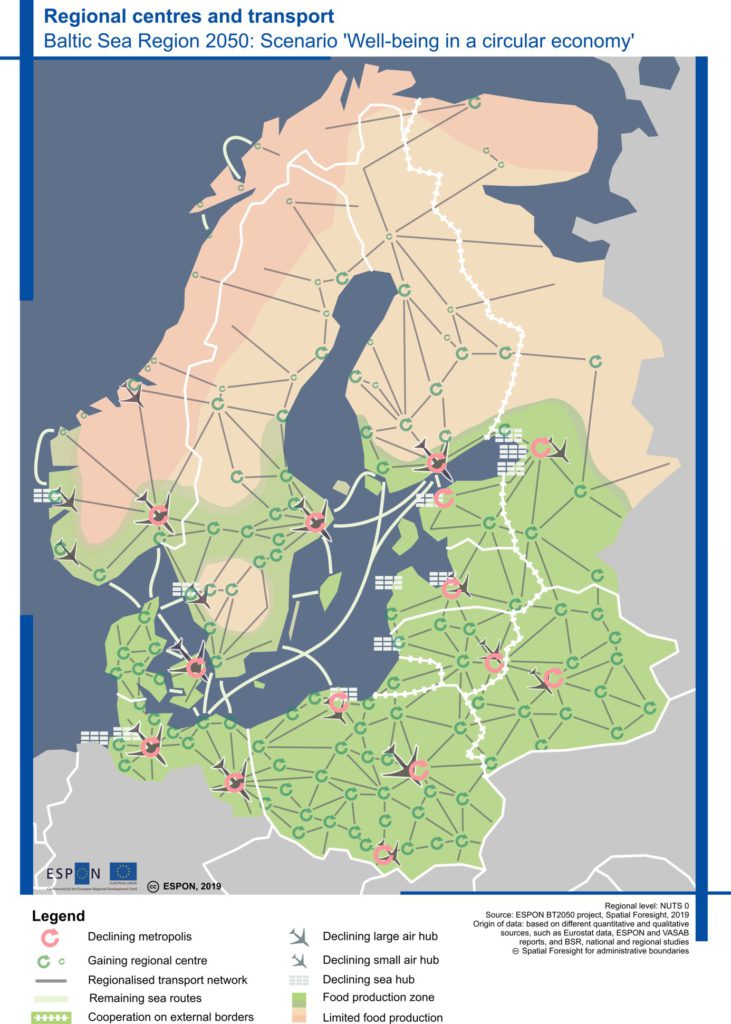
ESPON [Press Release] How with the Baltic Sea Region will look like in 2050? Three scenarios for the future of the #BSR based on the findings of our BT2050 project.
The Baltic Sea Region (BSR) includes Poland, Belarus, Lithuania, Latvia, Estonia, Finland, Norway, Sweden and Denmark as well as North-West Russia and Northern Germany. The BSR is the first European macro-region having a vision for spatial development (adopted in 1994, renewed in 2009).
Over the past few decades, the Baltic Sea Region (BSR) has been growing, both in terms of population and economy. The region has also become more integrated thanks to increased cooperation.
But how will the Baltic Sea Region look like in 2050? The ESPON project “BT2050” has been exploring a variety of territorial development challenges and trends that might shape the further development of the region and published its results today.
Current trends
While urbanisation and rapidly shrinking rural areas are common trends for the all Baltic Sea countries, some significant differences can be observed. For example, the differences in population density between the northern and southern countries of the BSR (Finland – 17 inhabitants/km2 and Germany – 172 inhabitants/km2) influence the spatial pattern of the region, in which cities in the South of the region are more connected. The study shows that the depopulation of rural areas slowed down in the countries which received international migrants in 2015-2016 (Germany, Sweden, Denmark and Norway)
Forecasting the future of territorial development
During the project, three scenarios have been developed for the Baltic Sea Region.
A Baseline Scenario offers a perspective about how the Baltic Sea Region will look like in 2050 if trends of the recent past (e.g. steady economic growth, the inflow of immigrants) and current policy practices (e.g. EU political integration) continue to be in effect in the following three decades. In a scenario where the trends are stable, the rural-urban divide will continue to grow. This implies that bigger cities will keep generating economic power and will be able to attract more people while the rural areas will continue to decline.
Two alternative territorial scenarios were also developed for the Baltic Sea Region. The first one called ‘Well-being in a circular economy: a RE-mind of a good life’ and the second one ‘Growing into green-tech giants: the ecological footprint clear-up.’
The scenario ‘Well-being in a circular economy: a RE-mind of a good life’ envisions the Baltic Sea Region as a place with an active citizen involvement in the transition from the existing linear economic model in favour of a circular economy that focuses on a better quality of life. The role of the smaller cities and towns will be more prominent in this scenario which might result in a boost in local production as well as reduced consumerism.
The scenario ‘Growing into green-tech giants: the ecological footprint clear-up’ pictures the Baltic Sea Region as a giant in green technology and innovation. A reduced ecological footprint increased eco-production, and a ‘guilt-free’ consumerism are some of the characteristics of this scenario.
These scenarios aim to support VASAB members to design and implement evidence-based policies for the future of the Baltic Sea Region. Eight stakeholders from seven countries, all members of VASAB implemented the project:
- Ministry of Economic Development, Department of Development Strategy, PL (Lead stakeholder)
- Ministry of the Environment, Department of the Built Environment, FI
- Ministry of Finance, Spatial Planning Department, EE
- Ministry of Environment, Construction and Territorial Planning Department, LT
- Federal Ministry of Transport and Digital Infrastructure, Department Policy Matters, Division G31 European Spatial Development Policy and Territorial Cohesion, DE
- Ministry of Environmental Protection and Regional Development, Spatial Planning Department, LV
- Federal Institute for Research on Building, Urban Affairs and Spatial Development, DE
- State Regional Development Agency, VASAB Secretariat, LV
The project has been running for a year, coordinated by Nordregio (SE) in collaboration with Spiekermann & Wegener, Urban and Regional Research (DE) Spatial Foresight (LU) and Institute of Geography and Spatial Organisation (PL).
Note to the Editors
ESPON is the European Territorial Observatory Network that provides scientific analyses and advice for territorial and sectoral policies in a number of contexts including economy and finance, unemployment, foreign direct investment, circular and low-carbon economy, healthcare, migration, etc. ESPON supports the discussions on the future of EU policies, notably the Cohesion Policy, as well as the upcoming preparation for the next generation of strategies and programmes at national, regional and local scales. ESPON is co-funded by the European Regional Development Fund. More at: www.ESPON.eu
The ESPON 2020 Programme is a pan-European programme managed by the Luxembourgish Ministry of Sustainable Development and Infrastructure on behalf of all EU Member States, Island Lichtenstein, Norway and Switzerland and co-funded by the European Regional Development Fund under Interreg.
For further information, quotes, or images, please contact Nikos Lampropoulos of ESPON EGTC at nikos.lampropoulos@ESPON.eu or call +352 20 600 280 26 or +32485203321 (mob)
Download the ESPON documents here: